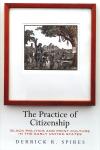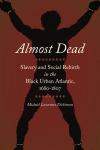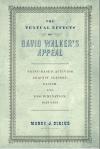African American Studies
| In Search of Phillis Wheatley | Phillis Wheatley was only about 7 years old when she stepped off a slave ship in Boston harbor in 1761. She rose from the indignity of enslavement to earn international celebrity, only to die in obscurity and poverty. As the first person of African descent and the second woman in America to publish a book, Wheatley wrote remarkable contributions on topics ranging from religion to politics. Wheatley is now widely recognized as the mother of African-American literature. |
|

|
Relative Races: Genealogies of Interracial Kinship in Nineteenth-Century America | In Relative Races, Brigitte Fielder presents an alternative theory of how race is ascribed. Contrary to notions of genealogies by which race is transmitted from parents to children, the examples Fielder discusses from nineteenth-century literature, history, and popular culture show how race can follow other directions: Desdemona becomes less than fully white when she is smudged with Othello's blackface, a white woman becomes Native American when she is adopted by a Seneca family, and a mixed-race baby casts doubt on the whiteness of his mother. |

|
From Slave Cabins to the White House: Homemade Citizenship in African American Culture | Koritha Mitchell analyzes canonical texts by and about African American women to lay bare the hostility these women face as they invest in traditional domesticity. Instead of the respectability and safety granted white homemakers, black women endure pejorative labels, racist governmental policies, attacks on their citizenship, and aggression meant to keep them in "their place." |

|
Revisiting America’s Unfinished Revolution | Columbia University professor and AAS member Eric Foner (elected 1989) will discuss his groundbreaking and definitive 1988 book, Reconstruction: America's Unfinished Revolution, 1863-1877. This work won the Bancroft Prize, the Francis Parkman Prize, the Los Angeles Times Book Award, the Avery O. Craven Prize, and the Lionel Trilling Prize. |

|
The Practice of Citizenship: Black Politics and Print Culture in the Early United States | In The Practice of Citizenship: Black Politics and Print Culture in the Early United States, Derrick R. Spires examines the parallel development of early black print culture and legal and cultural understandings of U.S. citizenship, beginning in 1787, with the framing of the federal Constitution and the founding of the Free African Society by Absalom Jones and Richard Allen, and ending in 1861, with the onset of the Civil War. Between these two points he recovers understudied figures such as William J. |

|
To Make Negro Literature: Writing Literary Practice and African American Authorship | In To Make Negro Literature Elizabeth McHenry traces African American authorship in the decade following the 1896 legalization of segregation. She shifts critical focus from the published texts of acclaimed writers to unfamiliar practitioners whose works reflect the unsettledness of African American letters in this period. Analyzing literary projects that were unpublished, unsuccessful, or only partially achieved, McHenry recovers a hidden genealogy of Black literature as having emerged tentatively, laboriously, and unevenly. |

|
Almost Dead: Slavery and Social Rebirth in the Black Urban Atlantic | Beginning in the late seventeenth century and concluding with the abolition of the Atlantic slave trade, Almost Dead reveals how the thousands of captives who lived, bled, and resisted in the Black Urban Atlantic survived to form dynamic communities.Michael Lawrence Dickinson uses cities with close commercial ties to shed light on similarities, variations, and linkages between urban Atlantic slave communities in mainland America and the Caribbean. |

|
The Textual Effects of David Walker's "Appeal" Print-Based Activism Against Slavery, Racism, and Discrimination, 1829-1851 | Historians and literary historians alike recognize David Walker's Appeal to the Coloured Citizens of the World (1829-1830) as one of the most politically radical and consequential antislavery texts ever published, yet the pamphlet's significant impact on North American nineteenth-century print-based activism has gone under-examined. In The Textual Effects of David Walker's "Appeal" Marcy J. Dinius offers the first in-depth analysis of Walker's argumentatively and typographically radical pamphlet and its direct influence on five Black and Indigenous activist authors, Maria W. |

|
The Strangers Book: The Human of African American Literature | The year 1845 saw the publication of two key texts in the African American literary tradition: Frederick Douglass’s Narrative of the Life of Frederick Douglass, American Slave, Written by Himself and a collection of francophone poetry published in New Orleans by a group of free men of color and titled Les Cenelles: Choix des poésies indigènes. |

|
Fugitive Texts: Slave Narratives in Antebellum Print Culture | Antebellum slave narratives have taken pride of place in the American literary canon. Once ignored, disparaged, or simply forgotten, the autobiographical narratives of Frederick Douglass, Harriet Jacobs, and other formerly enslaved men and women are now widely read and studied. One key aspect of the genre, however, has been left unexamined: its materiality. What did original editions of slave narratives look like? How were these books circulated? Who read them? |